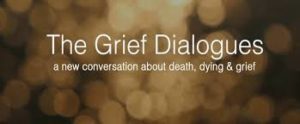This month, I had the pleasure of speaking with Elizabeth Coplan, the brain behind The Grief Dialogues, a non-profit artistic movement dedicated to creating new dialogue about death, dying and grief. The Grief Dialogues started as a live theater event that included an on stage follow-up discussion moderated by a grief counselor, to give people the chance to open up about their stories and ask questions.
Editors’ Note: This interview has been edited for length and readability.

Credit: twitter.com
Ellary Allis: Do you think there’s one art form that is particularly effective when it comes to processing grief, or do you think it’s a matter of personal proclivities?
Elizabeth Coplan: Creative expression, whether it be writing, art or music, helps people process their grief, their anticipatory grief, and their end of life issues. It also opens up a dialogue about death and dying for those who read or watch or listen to this art. People who have seen “The Grief Dialogues” have opened up to me about their own experiences, sharing stories that they had never shared with anyone before.
Writing is the way I am able to reconcile my own grief, and when I share my writing I find that I’m helping others reconcile theirs. For instance, when people experience my play, “Hospice: A Love Story,” whether they read it or saw it, I found that they wanted to to share their stories with me. They often didn’t have other opportunities to do that, but hearing my story gave them permission to open up. It released tension that they were feeling from having to keep it all inside. It was the same with “The Grief Dialogues.”
Also for me, the process of writing helps me move through my grief, and move on in a loving way.
Ellary: You contributed to a book called “Just A Little More Time,” a compilation of stories and poems about loss and love from 56 authors. Can you speak a little bit about this book?
Elizabeth: Each story or poem from each of the authors is different, but each story is striving towards healing — healing for the author and healing for the readers. They are also striving for connection in this way. That’s what has driven me to share my own writing, whether it be an essay or a play.
When you read or see a play, you create a connection with the author. Reading someone else’s story also inspires compassion. I’ve never experienced much of what the other contributing authors have, but when I read their stories I feel immense compassion for them. The stories and poems in this book range from sharing tender last moments with loved ones to musing about what happens when we die. There is an underlying message woven throughout all of the pieces, which is that you can find hope after significant loss.

Credit: Facebook.com
Ellary: You co-produced a short film called “8 A.M.” for “The Grief Dialogues” along with playwright Mark Harvey Levine, who adapted the screenplay from a play. What is the story behind the film?
At the time when “The Grief Dialogues” was starting to expand beyond the single 10-minute play about death, dying and grief, two young filmmakers, Emily Pando and Jesse Amorratanasuchad, were introduced to me by my son’s girlfriend, and came into my office to discuss an idea for a film.
We at “The Grief Dialogues” knew that our project would need to include different artistic mediums to reach the general public, and film is a great medium for reaching a broader audience. Mark Harvey Levine had submitted a short play called “LA 8 A.M.” to The Grief Dialogues for our production of short plays, and we decided to adapt that play into a screenplay for our film. “8 A.M.” was an official selection of the Celluloid Bainbridge Film Festival and won the Opening Night Party screening. Since then it has screened in film festivals held in Houston, Cleveland and Seattle.
Ellary: What advice would you have for those looking to express their grief through art, whether it be writing, painting, music, performing, etc.?
Elizabeth: Whether you write in a journal, or draw in your sketchpad, it doesn’t have to be a publishable work of art to provide you healing. The act of expression is healing.
Ellary: Thank you, Elizabeth, for sharing your vision and your work with me and our readers!
Elizabeth Coplan: You’re very welcome.
Did you miss part one of my interview with Elizabeth? If so, you can catch up here.

 What Is The Grief Dialogues?
What Is The Grief Dialogues?


 “Help Me, Helen”
“Help Me, Helen”
 Recovering Cremation Remains After the Los Angeles Fires
Recovering Cremation Remains After the Los Angeles Fires
 “As Tears Go By” by Marianne Faithfull
“As Tears Go By” by Marianne Faithfull














